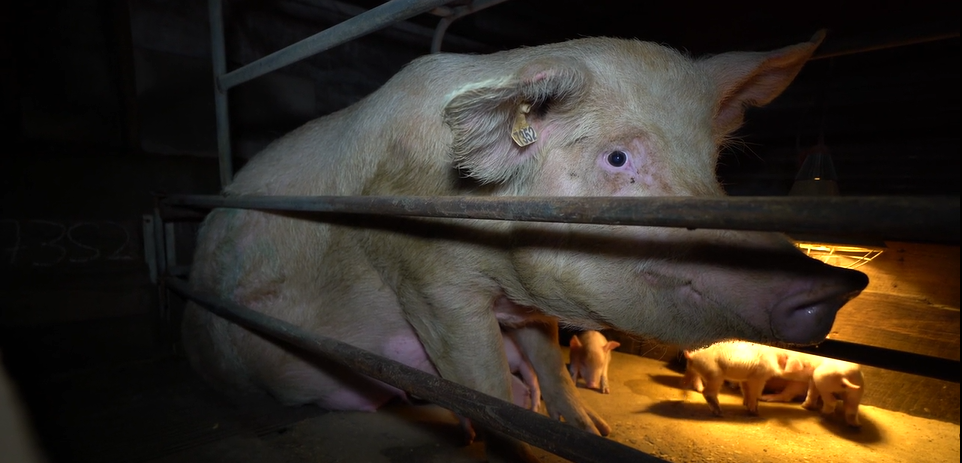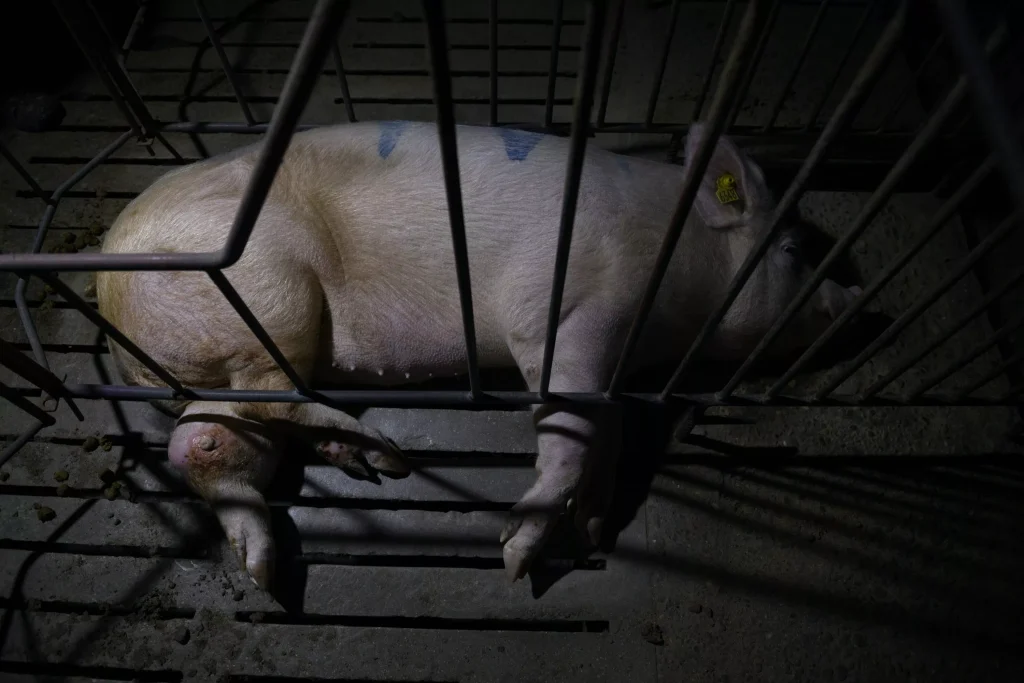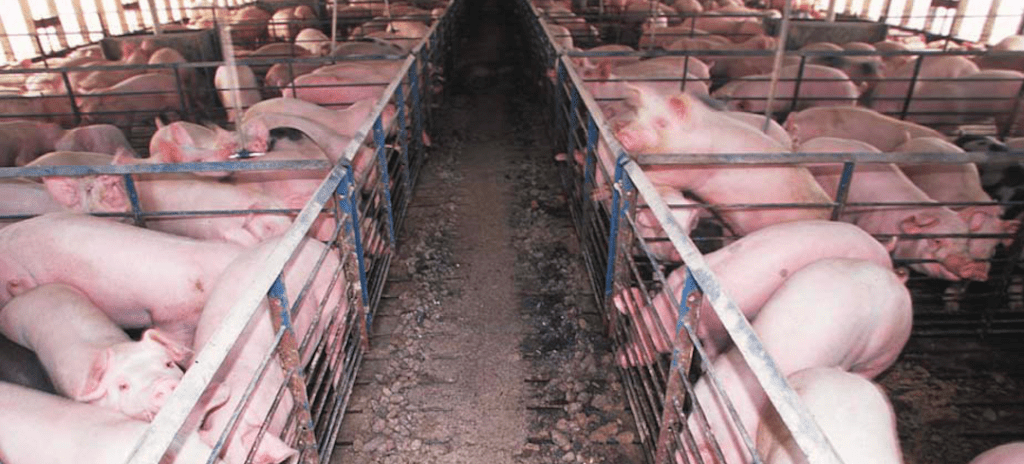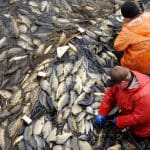Фабричното животновъдство, система, проектирана за максимална ефективност, превърна отглеждането на свине в процес, който често пренебрегва хуманното отношение към животните. Зад затворените врати на тези операции се крие суровата реалност на жестокост и страдание. Свинете, високоинтелигентни и социални животни, са подложени на нехуманни практики, които дават приоритет на печалбите пред тяхното благополучие. Тук разкриваме някои от най-шокиращите условия и третирания, на които са подложени отглежданите свине във фабрики.
Тясно заточение: Живот на неподвижност и мизерия
Един от най-тревожните аспекти на свиневъдството е затварянето на свине-майки, или разплодни прасета, в клетки за бременност - тесни метални заграждения, които олицетворяват жестоката ефективност на фабричното животновъдство. Тези клетки са едва по-големи от самите свине, често с размери само 60 см ширина и 2,1 м дължина, което прави физически невъзможно животните да се обърнат, разтегнат или легнат удобно. Свинете-майки прекарват почти целия си живот в тези ограничителни пространства, издържайки на продължителни периоди на обездвижване, които продължават месеци по време на всеки цикъл на бременност.

Тази принудителна неподвижност води до тежки физически заболявания , включително мускулна атрофия, отслабени кости и хронична болка в ставите. Липсата на движение също така увеличава риска от декубитални рани и кожни лезии, тъй като прасетата не са в състояние да променят позицията си, за да облекчат дискомфорта. Непрестанното затваряне се отразява негативно на дихателната и кръвоносната система на прасетата, утежнявайки страданието им.
Психологическото въздействие е също толкова мъчително. Прасетата са интелигентни и социални същества, които естествено участват в сложни поведения като търсене на храна, изграждане на гнезда и социализиране с връстниците си. Безплодната, ограничаваща среда на клетките за бременност обаче им лишава тези основни инстинкти, което води до дълбок психически стрес . Много свине майки развиват анормално, повтарящо се поведение, като например захапване на пръти или фалшиво дъвчене, ясни признаци на фрустрация и умствен упадък. Тези поведения са пряк резултат от скука, стрес и невъзможност да изразят естествените си инстинкти.
Последиците от затварянето се простират не само върху отделните свине. Проучванията показват, че подобни стресиращи условия на живот могат да отслабят имунната система на свинете, правейки ги по-податливи на заболявания. За да се борят с това, фермите за отглеждане на животни често прибягват до интензивна употреба на антибиотици, което допълнително изостря глобалния проблем с антибиотичната резистентност.
Въпреки широко разпространените критики от организации за защита на животните и потребители, клетките за бременност остават често срещана практика в много региони. Обществената осведоменост и застъпничество обаче бавно водят до промяна. Някои страни и щати са забранили изцяло използването на клетки за бременност, докато други преминават към групови системи за отглеждане, които осигуряват повече пространство и позволяват ограничено движение. И все пак, за милиони свине майки животът в тесни пространства остава тяхната мрачна реалност.
Осакатяване без анестезия: Болезнено начало на живота
Прасенцата, родени във ферми за отглеждане на животни, са подложени на жестоки и инвазивни процедури през първите си няколко седмици от живота, много от които се извършват без никаква форма на облекчаване на болката. Тези практики са оправдани от индустрията като необходими мерки за справяне с пренаселеността и повишаване на производителността, но те са със значителна цена за благосъстоянието на прасенцата.
Една от най-често срещаните процедури е купирането на опашките , при която работниците отрязват част от опашките на прасенцата, за да предотвратят захапването им – поведение, което възниква в стресираща, пренаселена среда на индустриални ферми. Тази процедура, извършвана без анестезия, е не само мъчителна, но може да доведе и до хронична болка и дългосрочно увреждане на нервите. По подобен начин зъбите на прасенцата се подрязват или изпиляват, за да се сведат до минимум нараняванията, причинени от агресивни взаимодействия с други прасенца. Премахването на острите им зъби често води до кървене на венците и повишена податливост към инфекции.
Мъжките прасенца също се подлагат на кастрация , обикновено извършвана за намаляване на агресивното поведение и подобряване на вкуса на месото чрез елиминиране на „миризмата на глиган“. Тази инвазивна процедура включва разрязване на скротума на прасенцата, за да се отстранят тестисите им, всичко това без анестезия или следоперативни грижи. Травмата, причинена от кастрацията, е тежка и причинява силна болка и дистрес. Много прасенца пищят силно по време на процеса, което е ясен индикатор за агонията, която изпитват.
Тези болезнени процедури правят прасенцата уязвими към здравословни усложнения , включително инфекции, прекомерно кървене и нарушен растеж. Липсата на управление на болката отразява по-широко пренебрежение към благосъстоянието на животните, като се дава приоритет на ефективността и печалбата пред етичното отношение. Проучванията показват, че подобни травматични преживявания могат да имат дълготрайни последици, нарушавайки способността на прасенцата да се възстановяват и да процъфтяват в вече враждебна среда.
Усилията за справяне с тези практики са посрещнати със съпротива от страна на индустрията, въпреки нарастващата обществена загриженост и научните доказателства, подчертаващи жестокостта, която се прилага. Налични са алтернативи като облекчаване на болката по време на процедури или развъдни практики за минимизиране на необходимостта от осакатяване, но приемането им остава ограничено поради разходи и логистични предизвикателства.

С нарастването на осъзнаването на тези брутални реалности, потребителското търсене на етично отглеждано свинско месо може да наложи реформи в индустрията. Чрез подкрепа на сертифицирани за хуманно отношение продукти или намаляване на консумацията на свинско месо, хората могат да играят роля в оспорването на системната жестокост на фабричното отглеждане. За милиони прасенца обаче болезненото начало на живота остава норма, което подчертава спешната нужда от промяна.
Пренаселени и мръсни кочини: Живот, изпълнен с мизерия
След отбиването, прасетата, отглеждани във ферми за отглеждане на животни, се преместват в пренаселени кошари , където остават до клането. Тези кошари, проектирани за максимална ефективност, а не за благосъстояние, набиват животните плътно заедно, оставяйки малко място за движение или естествено взаимодействие. В такива затворени пространства на прасетата е отказана възможността да се занимават с инстинктивното си поведение, като например ровене в почвата, изследване на заобикалящата ги среда или формиране на стабилни социални йерархии. Вместо това те са подложени на среда, която насърчава стрес и страдание.

Подовата настилка в тези кошари обикновено е от твърди, ламели , предназначени да позволяват на отпадъците да падат за по-лесно почистване. Този дизайн обаче причинява значителни вреди на прасетата. Липсата на мека постелка води до болезнени рани и наранявания по краката и стъпалата им. Тези рани често се оставят нелекувани, излагайки животните на инфекции, които допълнително влошават страданието им. Освен това, ламели не правят много за смекчаване на натрупването на отпадъци и прасетата са принудени да живеят сред собствените си изпражнения и урина, създавайки нехигиенични и токсични условия.
Натрупването на отпадъци генерира високи нива на амоняк и други вредни газове , които насищат въздуха, който свинете дишат. Продължителното излагане на тези вредни изпарения може да причини респираторни проблеми, дразнене на очите и цялостно влошаване на здравето. Постоянното излагане на такава замърсена среда отслабва имунната им система, правейки ги по-податливи на болести, които се разпространяват бързо в пренаселени условия.

Стресът от тези условия често предизвиква агресивно поведение , като хапане и бой между прасетата. В екстремни случаи, фрустрацията и липсата на пространство водят до канибалистично поведение, при което прасетата атакуват и се нараняват взаимно. За да се сведат до минимум нараняванията, причинени от тези неестествени поведения, индустриалните ферми прибягват до осакатяване, като например купиране на опашки, което допълнително утежнява жестокостта на системата.
Пренаселеността и лошите хигиенни условия също улесняват разпространението на болести, принуждавайки фермите да разчитат в голяма степен на антибиотици , за да предотвратят огнища. Тази прекомерна употреба допринася за нарастващата глобална криза на антибиотична резистентност, представлявайки сериозна заплаха както за здравето на хората, така и на животните.
Въпреки очевидната жестокост и рискове, практиката на пренаселеност на свинете остава широко разпространена в индустриалното земеделие. Усилията за подобряване на условията, като например осигуряване на повече пространство и достъп до външна среда, набират бавна скорост поради опасения за разходите. Обществената осведоменост и търсенето на по-високи стандарти за хуманно отношение към животните са от решаващо значение за тласкането на индустрията към по-хуманни практики.
За милионите прасета, затворени в тези мръсни кочини, животът се определя от страдание. Като избират етично произведени продукти или подкрепят алтернативни системи за земеделие, потребителите могат да играят роля в оспорването на тази експлоататорска система и да се застъпят за по-състрадателен подход към животновъдството.

Системно малтретиране и пренебрегване
Разследванията разкриха шокиращи случаи на малтретиране във фабрични ферми. Работниците, под натиск да поддържат производителността, често се отнасят грубо със свинете. Има съобщения за свине, които са били бити, ритани или неправилно зашеметявани преди клане, оставяйки ги в съзнание по време на процеса на умъртвяване. Ранените или болни свине често се оставят без лечение, а страданието им се игнорира до смъртта.
Пътят към промяната: Застъпничество за състрадателни земеделски практики
Системните страдания, понасяни от свинете във фермите за отглеждане на животни, подчертават неотложната нужда от трансформативна промяна в селскостопанския сектор. Бруталните условия, пред които са изправени тези животни, не са неизбежни, а по-скоро са резултат от политики и практики, водени от ефективност и печалба за сметка на хуманното отношение към животните. Промяната изисква колективни действия от страна на правителствата, лидерите в индустрията и потребителите.
Прилагане на по-строги разпоредби
Правителствата и регулаторните органи играят ключова роля в оформянето на бъдещето на животновъдството. по-строги закони за хуманно отношение към животните , за да се забранят нехуманните практики като клетки за бременност, купиране на опашки и кастрация без облекчаване на болката. Тези реформи трябва да включват задължително осигуряване на пространство, достъп до обогатяване на средата и ветеринарен надзор, за да се гарантира, че свинете не са подложени на ненужно страдание. Освен това, рутинните инспекции и санкциите за неспазване са от съществено значение, за да се държи индустриалните ферми отговорни. Държавите, които вече са въвели прогресивни политики за хуманно отношение към животните, като например забрана на клетките за бременност, могат да служат като модели за подражание на други.
Ролята на потребителя
Подкрепата за растителни алтернативи и възприемането на устойчиви диети може допълнително да намали зависимостта от интензивни земеделски системи. Повишената осведоменост и образование относно реалностите на фабричното земеделие могат да вдъхновят повече хора да правят състрадателни избори.
Застъпничество за системна промяна
Отвъд индивидуалните действия, колективната защита е от решаващо значение. Организациите за защита на животните, активистите и загрижените граждани могат да работят заедно, за да водят кампании за по-строги закони, да насърчават етичното земеделие и да разкриват суровите реалности на фабричното земеделие. Общественият натиск върху корпорациите да приемат хуманни политики и прозрачност във веригите си за доставки може да доведе до значителни промени на индустриално ниво.
Визия за бъдещето
Създаването на по-състрадателна селскостопанска система е предизвикателна, но постижима цел. Като даваме приоритет на хуманното отношение към животните, намаляваме въздействието върху околната среда и приемаме иновативни решения, можем да се насочим към бъдеще, в което страданието на свинете и други селскостопански животни вече няма да е приета норма. Пътят към промяната започва с осъзнаването на нашата споделена отговорност да се отнасяме към всички живи същества с достойнство и уважение.

Хуманно бъдеще: Състрадание в действие
Прасетата, като разумни същества, имат способността да чувстват болка, радост и да формират сложни социални връзки, но в индустриалната земеделска система те са лишени дори от най-основните достойнства. Животът им е сведен до обикновени стоки, продиктувани от практики, водени от печалба, които игнорират присъщата им стойност. Тази сурова реалност обаче не е неизменна – тя може да бъде променена чрез осъзнаване, застъпничество и целенасочени действия.
Признаване на стойността на разумния живот
Научните изследвания многократно показват, че свинете са интелигентни същества, способни да решават проблеми и да изразяват емоции. Въпреки това, страданието им е нормализирано във фермите за отглеждане на животни. Признаването на тяхната разумност ни задължава да оспорим статуквото и да се застъпваме за тяхното благосъстояние. Разглеждането на свинете не като продукти, а като живи същества, заслужаващи уважение, е първата стъпка към насърчаване на по-хуманни отношения с животните.
Силата на осъзнаването
Образованието е мощен инструмент за промяна. Повишаването на осведомеността относно условията, на които свинете понасят във фермите за отглеждане на животни, разкрива скритите реалности на индустриалното земеделие. Като споделяме тези знания, можем да вдъхновим съпричастност и да мотивираме колективни действия. Кампаниите за повишаване на осведомеността, документалните филми и прозрачното етикетиране на животинските продукти играят жизненоважна роля в промяната на обществените възприятия и насърчаването на отчетност в индустрията.
Застъпничество за системна реформа
Истинският напредък изисква системна промяна. Това включва застъпничество за по-строги разпоредби за хуманно отношение към животните, забрана на жестоки практики като клетки за бременност и немедикаментозно осакатяване, както и подкрепа за прехода към етични земеделски системи. Движенията на местно ниво, петициите и сътрудничеството с организации за хуманно отношение към животните могат да усилят тези усилия, като гарантират, че състраданието ще се превърне в крайъгълен камък на селскостопанската политика.
Устойчива и етична хранителна система
Изграждането на хуманно бъдеще не е само облекчаване на страданието на животните, но и създаване на устойчива хранителна система, която е от полза за всички. Етичните земеделски практики често са в съответствие с опазването на околната среда и общественото здраве, което ги прави печелившо решение за животните, хората и планетата. Като подкрепяме фермерите, които дават приоритет на благосъстоянието и устойчивостта, ние допринасяме за по-балансиран и отговорен подход към производството на храни.
Заедно за промяна
Страданието на отглежданите свине е мрачна реалност, но не е неизбежна. Осъзнаването е семето, от което поникват действията. Като се обединим, за да се противопоставим на системите, които увековечават жестокостта, можем да поискаме по-добър живот за животните, които споделят нашия свят. Състрадателното земеделие не е просто идеал – то е необходимост за едно справедливо и етично общество.
Всеки избор е от значение. Всеки глас е от значение. Заедно можем да изградим бъдеще, в което уважението към всички живи същества е в основата на нашата хранителна система – бъдеще, в което свинете и другите селскостопански животни вече не се третират като стоки, а като същества, заслужаващи достойнство и грижа.















































